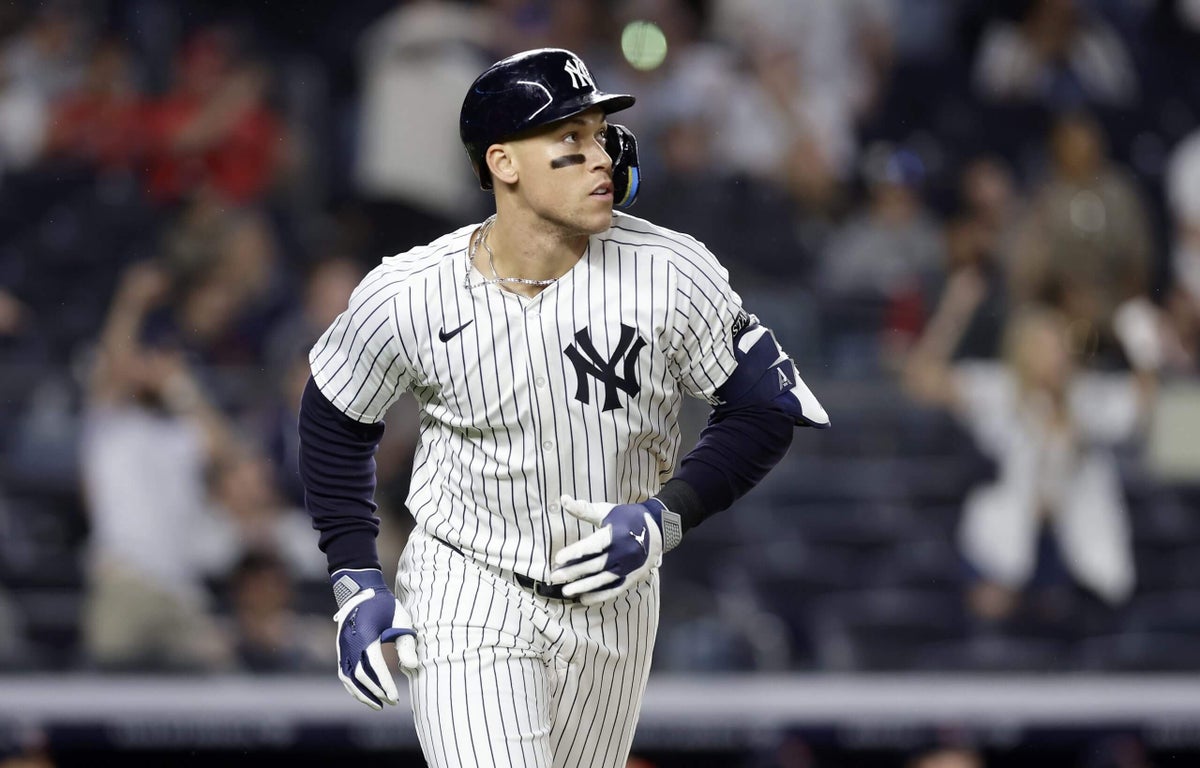NEW YORK — Aaron Judge has established himself as the world’s best hitter, he’s now collected his first batting crown, and he could be on his way to a third MVP trophy. But, as the New York Yankees captain prepares to lead his team into a wild-card showdown with the Boston Red Sox, there’s a glaring weakness in his otherwise Hall of Fame resume: his lack of production in the postseason.
It’s not just that Judge has grossly underperformed in October compared with his regular-season numbers. It’s that he’s failed — so far — to shine when it’s mattered most, like the Yankees legends he resembles in so many other ways.
Like Derek Jeter. Or CC Sabathia, 16 years ago.
On his first night as a Yankee after signing a seven-year, $161 million contract, Sabathia spent the evening celebrating with Jay-Z at the rapper’s 40/40 Club, where the future Hall of Fame pitcher quickly learned what it meant to be a part of baseball’s winningest franchise, a club that had won 26 World Series titles at the time.
Sabathia was no longer part of the Cleveland Indians or the Milwaukee Brewers. This was New York, where nothing other than being the best matters.
“I was sitting with Jay-Z and one of his buddies,” Sabathia recalled earlier this month. “They were talking about, ‘You need to win right away.’ I was like, ‘What are you talking about? I’m here for seven years.’ They were like, ‘Nah, you need to win immediately.’ I didn’t understand what it meant to walk into that clubhouse, and the team hadn’t won in so long.”
That was in December 2008. “So long” was eight years without winning it all.
The next season, Sabathia was the ace of the Yankees and the 2009 American League Championship Series MVP. The lasting image of the end of that World Series was Jeter throwing his arms into the air and greeting Mariano Rivera on the mound after the unanimous Hall of Fame closer recorded the final out against the Philadelphia Phillies.
Sabathia and those Yankees delivered a 27th title. But it’s been letdown after letdown for the club since then — a 15-year drought.
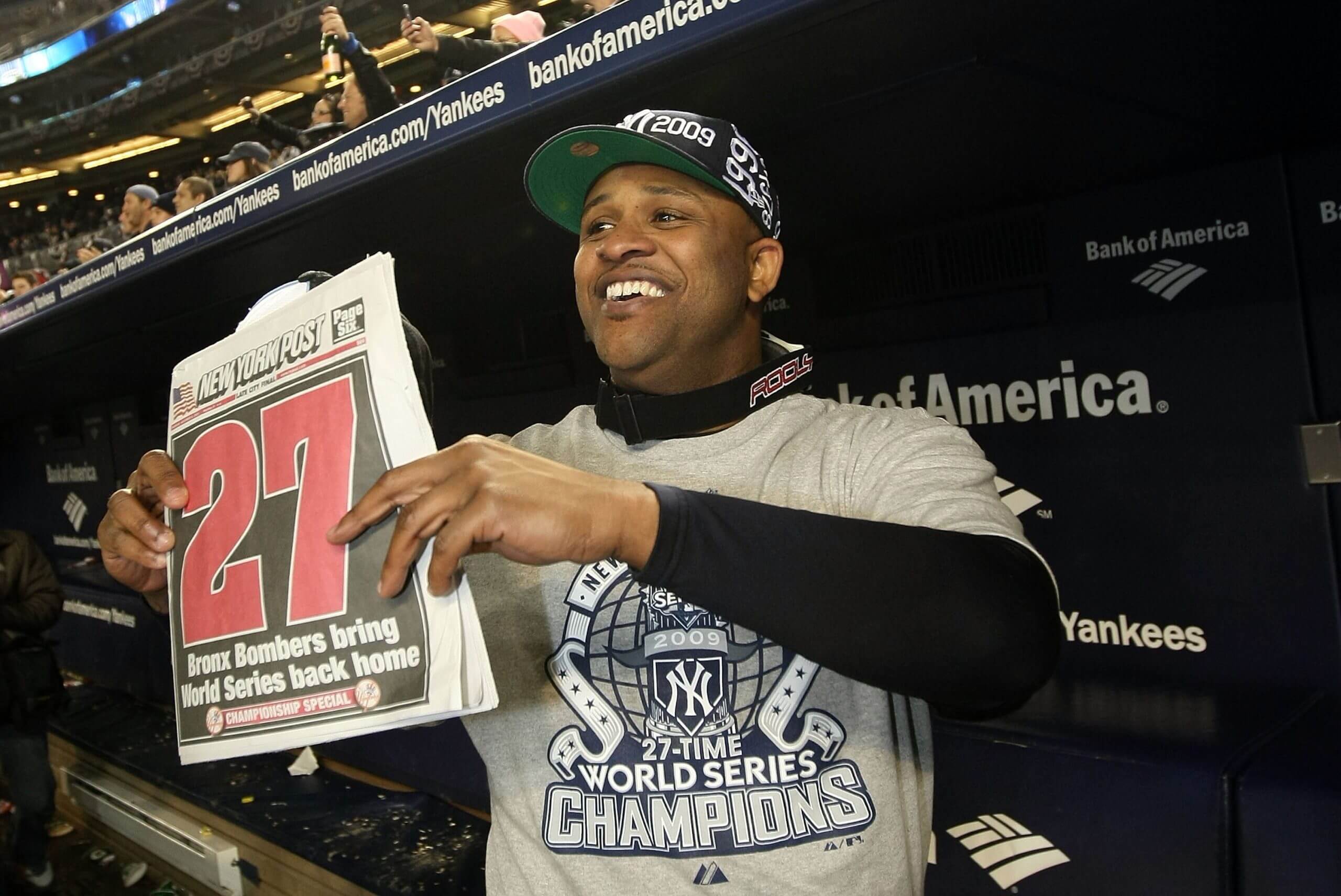
CC Sabathia celebrates after the Yankees won the 2009 World Series. (Nick Laham / Getty Images)
The Yankees advanced to the World Series last year for the first time since 2009, but they were defeated in five games by the Los Angeles Dodgers. During the team’s October run, no player received more scrutiny for their performance than Aaron Judge, the 2024 AL MVP winner.
The drop-off in the playoffs has been hard to ignore.
Judge has a career 178 wRC+, but it’s just 109 in the postseason. His numbers have been particularly brutal since the start of the 2019 postseason. In the 40 playoff games he’s played since then, he has a .669 OPS. There might not be a simpler reason for why the Yankees haven’t won a title in the Judge era than their best player not being at his best in October.
The All-Star right fielder understands the burden that comes with greatness. He’s lived it since his 2017 rookie season, when he hit 52 home runs. In 2022, during Judge’s quest to break Roger Maris’ single-season AL home run record, there was audible disappointment from the crowd whenever he did not launch a long ball. Every time Judge hits, otherworldly feats are expected — especially in October.
Baseball is a game of failure, but success — fairly or not — is a requirement for a player of Judge’s caliber.
“I don’t think they’d name me the captain if they didn’t think I could handle it,” Judge told The Athletic. “It’s part of it. That’s what I want. Especially playing in New York, the fans expect the most out of you every single night. They expect you to go 4-for-4 every night and win every game. You get a lot of heat when that doesn’t happen, but you got to be able to brush those things off and just keep showing up ready to work and giving your best.”
Bernie Williams, a four-time World Series champion, said Judge and the current Yankees have a cloud of pressure hovering over them that won’t go away because of what he and his teams of the 1990s and early 2000s accomplished.
Yankees manager Aaron Boone has led the Yankees since 2018, and he has said this year’s squad might be his most talented team yet. In doing so, Boone has placed even bigger stakes on what lies ahead for the Yankees in October. Because if Boone and Judge cannot lead this group to a title, it raises the question: When will it happen?
“They have come very close on several occasions, but they still have that thing that they still need to get accomplished,” Williams said in August. “They’re not getting any younger. Time is kind of running its course on this generation.”
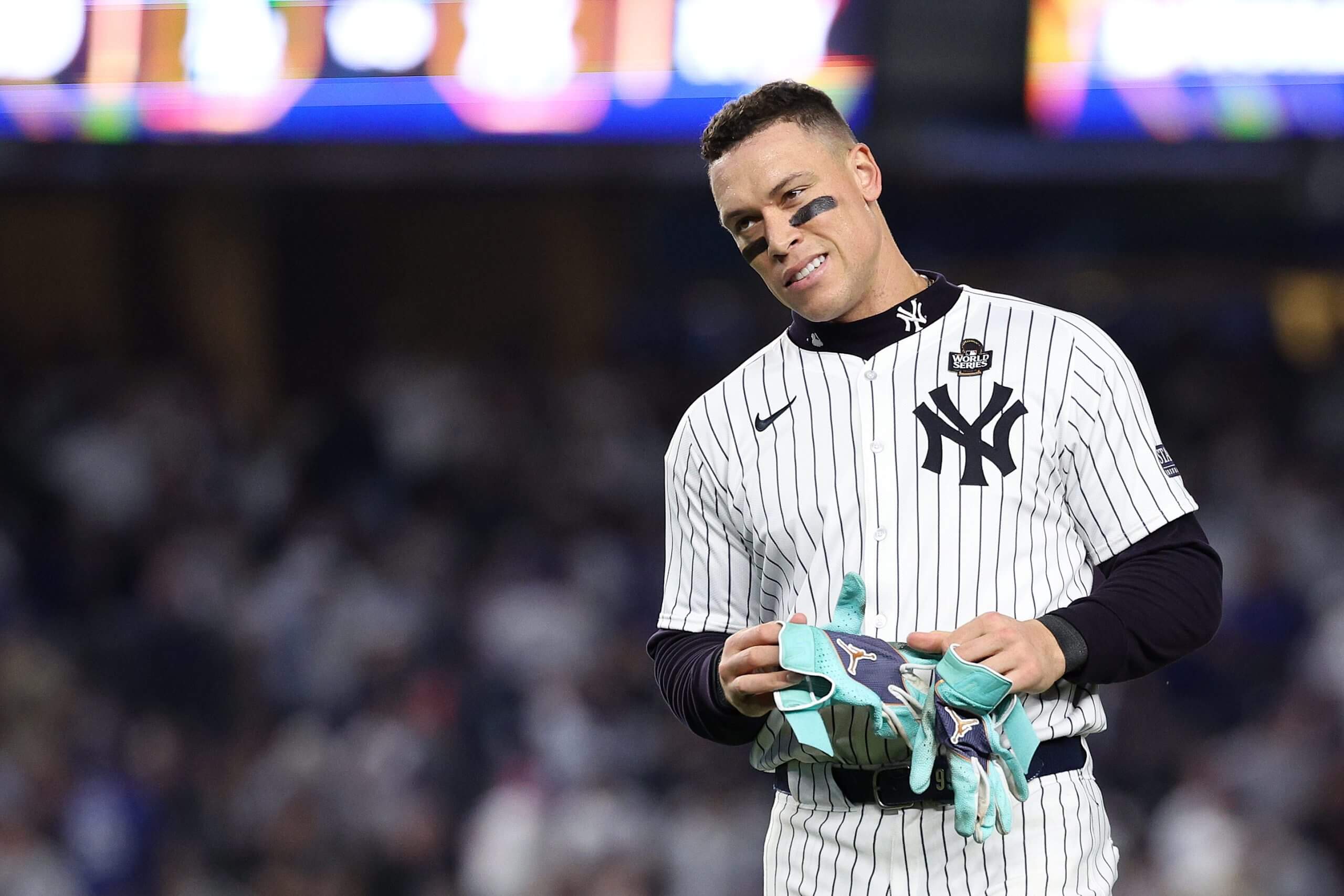
Aaron Judge reacts after being stranded on base during Game 5 of last year’s World Series. (Elsa / Getty Images)
There’s evidence Judge has pressed some in the postseason. In the regular season since 2017, Judge’s swing percentage is 42.1 percent; it rises to 45 percent in the postseason. He’s also made contact about 2 inches farther out in front of his body in October (32.7 inches in the postseason versus 30.5 inches in the regular season; the league average is 30.8 inches). Judge’s hitting mechanics allow him to let the ball travel deeper in the strike zone, giving him a few more ticks to recognize and turn on a pitch.
But when the postseason arrives, opposing teams’ strategy of how to pitch Judge changes. Teams are already cautious about throwing him fastballs because of his career .758 slugging percentage against four-seamers. Over his career in the regular season, 29 percent of the pitches Judge has seen are four-seamers. That drops to 23 percent in the postseason. The “missing fastballs” are replaced by curveballs, in particular. Judge has seen 8 percent curveballs in the regular season, but that usage jumps to 16.5 percent in the postseason. He’s whiffed on 57.4 percent of the curveballs he’s faced in October, which helps explain why Judge’s strikeout percentage rises by nearly 20 percent in October.
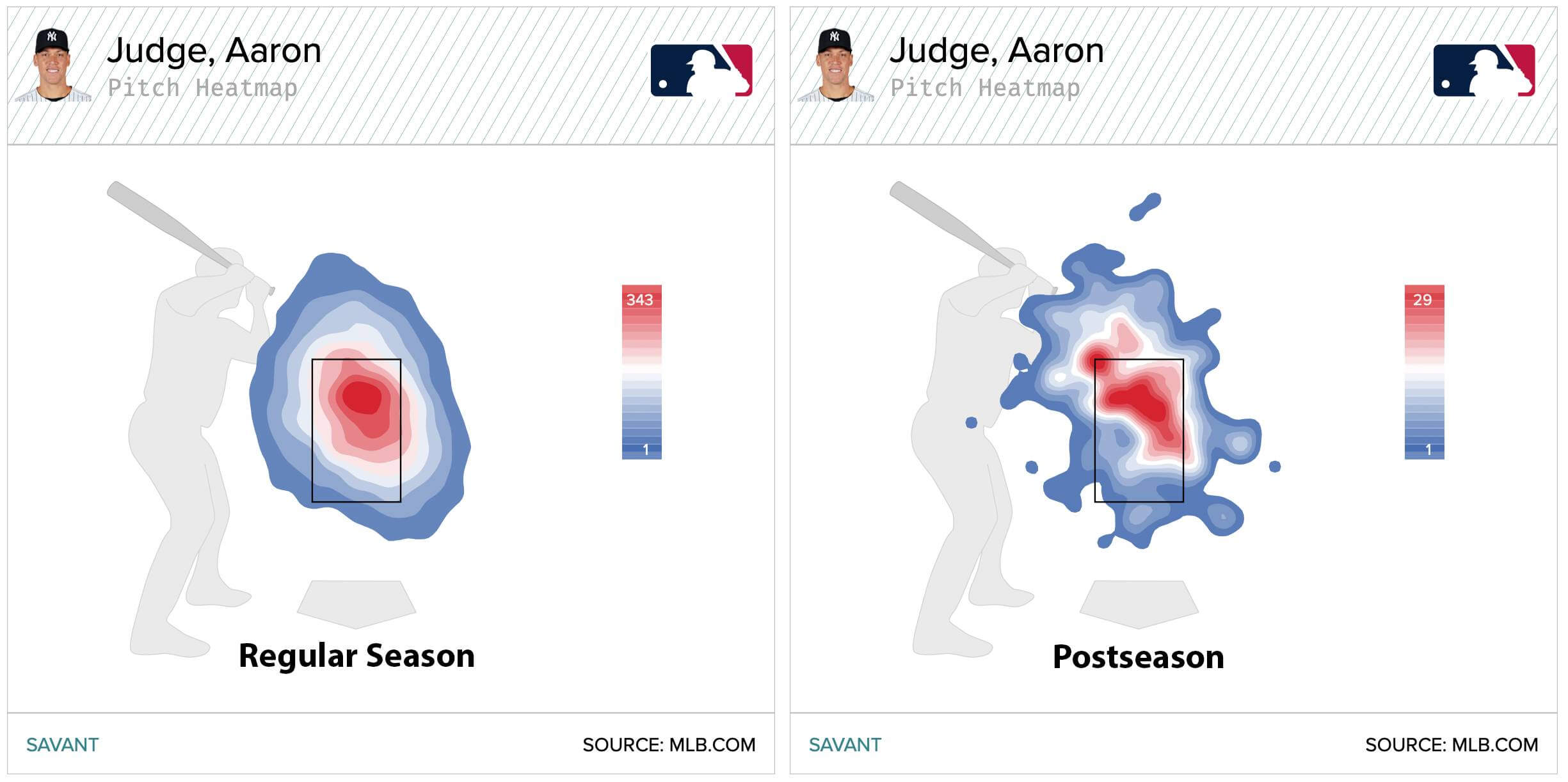
(This chart shows regular-season and postseason four-seamer locations against Aaron Judge over his career. Note the increased targeting of up and in against the slugger in October.)
Given his postseason struggles with curveballs, Judge’s tendency to swing more aggressively and get out in front of pitches more often than he does in the regular season could result in an uptick in whiffs when the stakes are highest. Still, it’s understandable why he’s trying to start his swing earlier. The average four-seam in the postseason is 1 mph faster and has a half-inch more ride, and he’s seeing more of them up and in, a spot in the zone that is a weakness for Judge. That elevated stuff forces him to cheat early, which in turn leaves him more vulnerable to off-speed pitches down in the zone.
But the expectation with a hitter as gifted as Judge is he’ll eventually look like the regular-season version of himself. And if he does that, the Yankees’ lineup will be difficult to slow down.
“Aaron is such a unicorn,” former Yankees third baseman Alex Rodriguez said last season. “I’ve never seen a player quite like him that looks like an NFL tight end. The guy is just a specimen. I can’t relate with that either because he makes me — (at 6 feet 3) — look small. He makes all of us look small. He has a unique element to him that (Jeter) and (Rivera) have is that no matter how big the stage is, he keeps the main thing, the main thing.
“I do think he will be a world champion, because that’s all he really cares about. As good as the numbers are, Aaron Judge wants to win, so I think he will.”
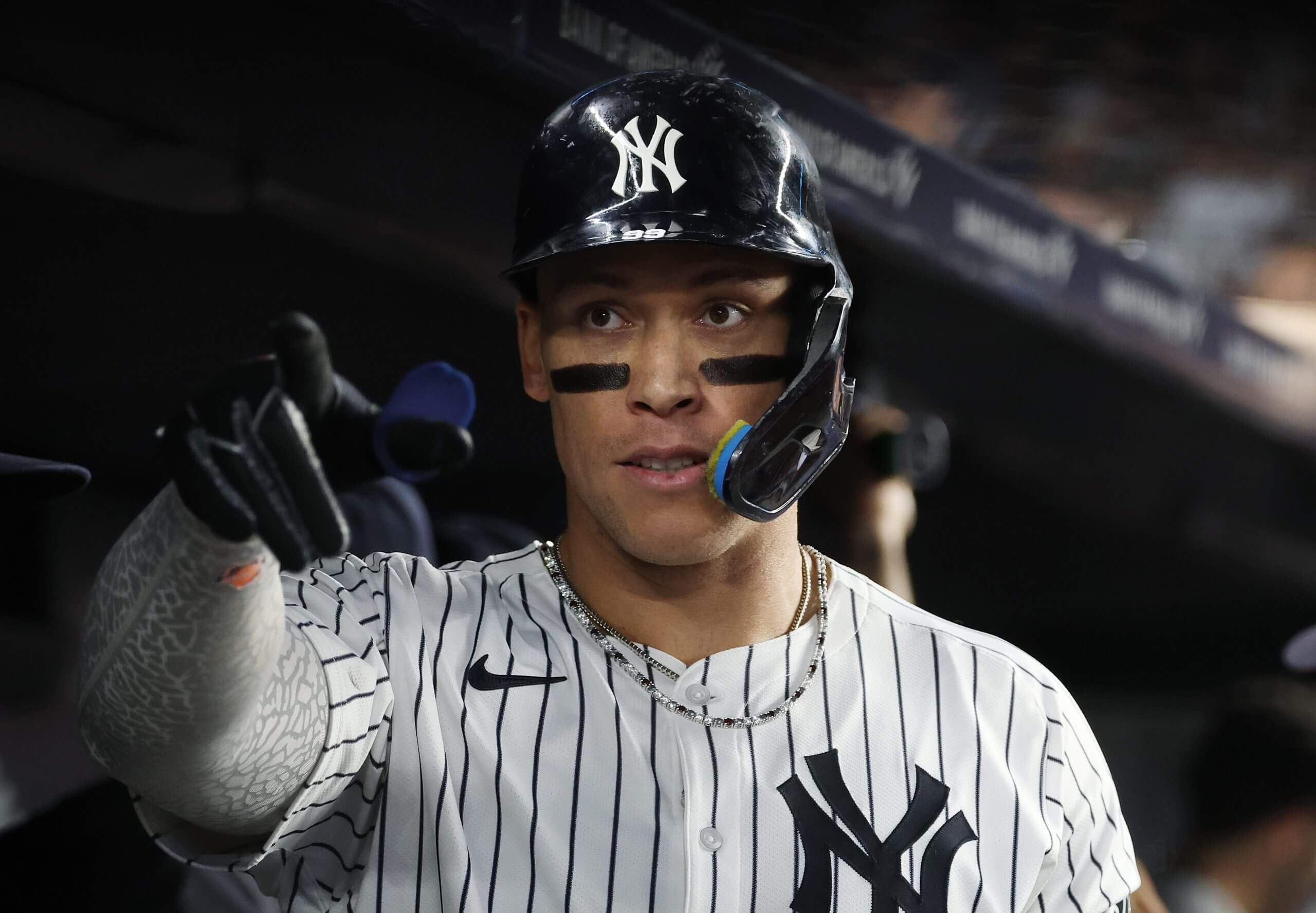
“I don’t think they’d name me the captain if they didn’t think I could handle it,” Aaron Judge said of the pressure. (Al Bello / Getty Images)
The only thing Judge is missing on his playing career resume is a title. He’s already one of this franchise’s greatest players. He’s fourth all time on the club’s home run leaderboard, and the only players ahead of him are the Holy Trinity of the Yankees’ storied past: Babe Ruth, Mickey Mantle and Lou Gehrig. But without a title to his name, it’s impossible for Judge to ever be considered alongside those legends. Without a championship, he’ll be this generation’s Don Mattingly, a beloved former captain who never won in pinstripes.
“I think he’s going to have a legacy, whether he wins or not, because he’s a special player,” Joe Girardi, Judge’s rookie-year manager, said last year. “I think, personally, it would mean a lot to him and the work that he’s put in because there’s nothing like being a champion.”
With the Yankees staring down elimination after falling behind 3-0 in the World Series to the Dodgers, Judge was asked point-blank whether he felt like he was letting his teammates down with his performance. At the time, Judge was 1-for-10 with four strikeouts in the Series. He paused for a few seconds before answering, “I’m not doing my job right now.”
A year later, Judge was asked what it’s like to deal with the pressure he’s under as the face of a franchise that is starved for its 28th championship. He knows that for the Yankees to reach the mountaintop, he needs to be comfortable in the spotlight, OK with the scrutiny that comes with being the game’s best hitter.
“I want that burden, because if I can take the weight off of other guys in this room so they go out there and produce and kind of fly under the radar and just do their job, then we have a better overall team,” he said.
— The Athletic’s Eno Sarris contributed to this report.
(Top photo: Jim McIsaac / Getty Images)

